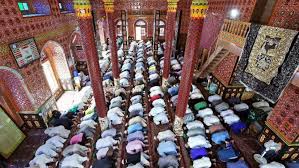Ramadan, also known as Ramzan, is a holy month in Islam observed by Muslims worldwide as a month of fasting, prayer, reflection, and community. It is believed to be the month in which the Quran was revealed to the Prophet Muhammad. During Ramadan, Muslims fast from dawn to sunset, abstaining from food, drink, smoking, and marital relations. The fast is broken each day with a meal called iftar, and the pre-dawn meal is called suhoor. Ramadan is considered a time of spiritual reflection, increased devotion, and worship. It is also a time for Muslims to practice self-discipline and empathy for those less fortunate, as well as a time for increased charitable activities and community gatherings. The blessings of Ramadan are believed to be numerous. It is considered a time when the gates of Heaven are open and the gates of Hell are closed, and Muslims believe that good deeds are more rewarded during this month. It is also a time for self-improvement and spiritual growth, as well as a time for strengthening bonds with family and community. Fasting during Ramadan can be a challenge for individuals with diabetes, as they need to manage their blood sugar levels carefully to avoid complications. It’s important for individuals with diabetes to consult with their healthcare provider before fasting to ensure it is safe for them. For individuals with diabetes who choose to fast, it’s important to: Monitor blood sugar levels regularly: Check blood sugar levels more frequently during fasting to ensure they remain within a safe range.Stay hydrated: Drink plenty of water between iftar (the meal to break the fast) and suhoor (the pre-dawn meal) to avoid dehydration.Choose healthy foods: Opt for complex carbohydrates, such as whole grains, fruits, and vegetables, and limit sugary and high-fat foods.Plan meals carefully: Divide food intake into smaller, more frequent meals to help manage blood sugar levels.Adjust medication: If necessary, adjust the timing or dosage of diabetes medications under the guidance of a healthcare provider.Be aware of symptoms: Be aware of signs of low or high blood sugar and know how to treat them.It’s crucial for individuals with diabetes to prioritize their health and safety during Ramadan fasting, and consulting with a healthcare provider is essential to develop a safe fasting plan.
Month of prayer, reflection, community


